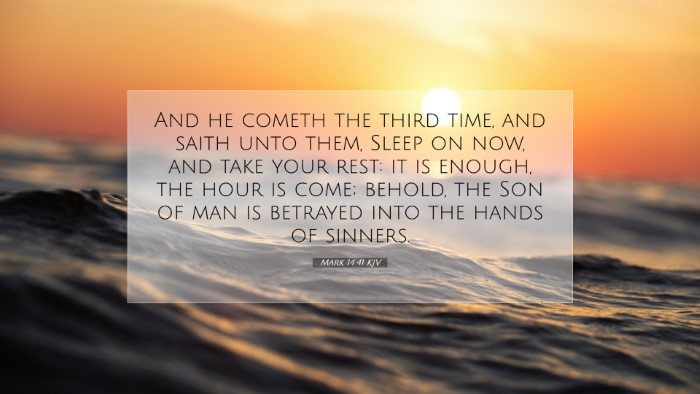Commentary on Mark 14:41
Verse Context: Mark 14:41 states: "And he cometh the third time, and saith unto them, Sleep on now, and take your rest: it is enough, the hour is come; behold, the Son of man is betrayed into the hands of sinners." This passage occurs in the Garden of Gethsemane, during a moment of profound anguish and prayer for Jesus, who is anticipating His imminent betrayal and crucifixion.
Introduction
This verse represents a critical juncture in the narrative of Mark's Gospel. It captures both the humanity of Christ and the apathy of His disciples. In their moment of need, the disciples succumb to sleep, highlighting their weakness and the gravity of the situation. This commentary synthesizes insights from several public domain commentaries, providing a comprehensive understanding suitable for pastors, students, theologians, and scholars.
Overview of Commentaries
- Matthew Henry: Henry’s exposition delves into the implications of Christ’s unwavering commitment to His mission amidst the disciples' failure to remain vigilant.
- Albert Barnes: Barnes’ analysis emphasizes the deep sorrow and the spiritual battle faced by Jesus during His time of prayer, contrasted with the disciples’ physical weakness.
- Adam Clarke: Clarke offers insights into the theological significance of “the hour” that has come, marking the divine plan's progression towards the crucifixion.
Insights from Matthew Henry
Matthew Henry highlights the profound nature of Christ's experience in Gethsemane. He remarks that this was not an ordinary moment for Jesus; it was a time of intense spiritual conflict. Henry points to the following key aspects:
- Human Weakness: The disciples, despite having been warned, succumb to sleep, illustrating human frailty and the struggle against spiritual lethargy.
- Divine Patience: Christ’s gentle rebuke of His disciples reflects His compassion. Even in their failure, He allows them rest, showcasing His understanding of human limitations.
- Preparation for Suffering: Jesus's prayer time is crucial; it prepares Him for the suffering ahead. Henry remarks on the need for believers to engage in prayer, especially in times of trial.
Insights from Albert Barnes
Albert Barnes elaborates on several themes associated with this passage:
- Emotional Turmoil: Barnes articulates the emotional weight Jesus bears, emphasizing that turmoil precedes divine will. He acknowledges the gravity of Jesus’ words, recognizing that His betrayers are approaching.
- Spiritual Vigilance: He stresses the importance of being spiritually alert. Barnes encourages reflection on the disciples' failure; this serves as a caution for believers regarding the necessity of awareness and preparedness in faith.
- Role of Prayer: The necessity of prayer, especially in moments of distress, is reiterated. Barnes encourages believers to remain steadfast in prayer, learning from Christ’s example.
Insights from Adam Clarke
Adam Clarke offers a theological perspective, examining the implications of the phrase "the hour has come." His commentary includes:
- Theological Significance: Clarke underscores the significance of this hour as part of the divine plan for salvation. The arrival of this moment signifies both fulfillment and the beginning of profound suffering.
- Christ’s Mission: Jesus’ acceptance of His fate is portrayed as an act of obedience to His Father’s will. Clarke discusses how this is not merely about suffering but about the necessity of sacrifice for redemption.
- Disciples' Role: He remarks on the failures of the disciples, noting that while Jesus requires them to be watchful, they remain oblivious. Clarke calls this failing a reminder for believers to remain awake and watchful in their faith journeys.
Theological Themes
This passage highlights several theological themes relevant for today’s believers:
- Suffering and Sacrifice: Jesus embraces His suffering as part of divine purpose. This serves as an example for Christians to find meaning in their trials.
- Human Vulnerability: The failure of the disciples reinforces the understanding of human limitations, calling for grace and reliance on God’s strength.
- The Call to Prayer: The emphasis on prayer underscores its vital importance in the life of the believer, especially in times of distress.
Application for Believers
As this passage is considered, several applications emerge that challenge and encourage believers today:
- Awareness of Spiritual Needs: Recognizing the constant need for vigilance in one’s spiritual life is crucial. Believers are encouraged to remain alert against complacency.
- Commitment to Prayer: Taking example from Christ's dedication to prayer provides a model for personal spiritual discipline, emphasizing the need to connect with God regularly.
- Understanding Suffering: Embracing the belief that suffering may serve a greater purpose can provide comfort. Believers are reminded that their struggles can contribute to their growth and testimony.
Conclusion
Mark 14:41 is a profound passage that illustrates the complexities of human frailty and divine purpose. By synthesizing insights from Matthew Henry, Albert Barnes, and Adam Clarke, we gain a deeper understanding of Jesus' determination in the face of impending betrayal and suffering. This commentary encourages believers to reflect on their own spiritual vigilance, the importance of prayer, and the value of understanding suffering within the context of God's redemptive plan.


